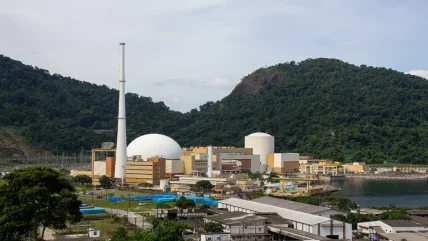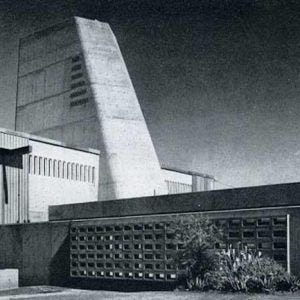
Brazil’s nuclear utility Eletronuclear said it will appeal against a court decision that has again paralysed construction work at unit 3 of the Angra NPP. The 2nd Civil Court of the District of Angra dos Reis revoked an injunction obtained by Eletronuclear in an arrest warrant that authorised the resumption of work at the unit.
Eletronuclear says that completion of Angra 3 – which was recently included in the Federal Government’s Growth Acceleration Programme (PAC) – is important to ensure security of supply for the Brazilian electrical system. With the entry of Angra 3 into operation, the energy generated by the Angra NPP will account for approximately 60% of the consumption of the state of Rio de Janeiro and 3% consumption in Brazil.
The plant will also diversify the electrical matrix and reduce the total costs of the National Interconnected System (SIN) by replacing the most expensive thermal energy that is often dispatched by the National Electric System Operator (ONS).
In addition, the unit will generate clean energy and will have minimal environmental impact. It is also near to the main consumption centres in the country, which will help to avoid congestion in the interconnections between the subsystems. Eletronuclear notes that construction of the plant is also essential to scale the entire production chain of the Brazilian nuclear sector, from fuel production to energy generation. Construction is expected to create 7.000 direct jobs, at the peak of the work, in addition to a much larger number of indirect jobs.
Angra NPP units 1&2 currently generate about 3% of Brazil’s electricity. Construction of Angra 3 with a Siemens/KWU 1405 MWe pressurised water reactor began in 1984 but was suspended after two years. The project resumed in 2006 and first concrete was poured in 2010. But work stopped again in 2015 following allegations of corruption involving government contracts. The unit was then 65% complete.
In November 2022, the newly appointed Eletronuclear President, Eduardo Grand Court, ordered construction to restart. However, in April the city government of Angra dos Reis ordered work to stop again. Mayor Fernando Jordão said he authorised the embargo “because Eletronuclear is executing a project that is not in accordance with what the municipality approved” including the promised payment of compensation. In May, Eletronuclear said it was committed to reversing the suspension of work and was seeking a constructive dialogue with the city of Angra dos Reis to clarify outstanding issues. Eletronuclear, however, obtained an injunction to continue the work.
In July, Eletronuclear reached an agreement with Angra dos Reis City Hall to pay “socio-environmental compensation” for the construction of unit 3 at the Angra NPP, which had been promised in 2009. The meeting, chaired by federal deputy Max Lemos, a key member of the Federal Chamber’s Mines & Energy Commission, discussed a number of issues which had caused tension between Eletronuclear and local communities.
The compensation promised to the municipalities of Angra dos Reis, Paraty and Rio Claro totals more than BRL300m ($62.7m).
At the meeting, Lemos stressed that the original agreement for compensation had been made 14 years ago. He said the agreement “is not a financial reparation, but a social debt that Eletronuclear has with the population of these municipalities, because over the years if this money had been paid, it would have been invested in public safety, education, health, sanitation and tourism”. While this appeared to be some kind of resolution of the dispute, the appeal court has now cancelled the injunction, once again stopping the work. Mayor Fernando Jordão says the compensation has still not been paid.
Image: Angra nuclear power plant (courtesy of Eletronuclear)






